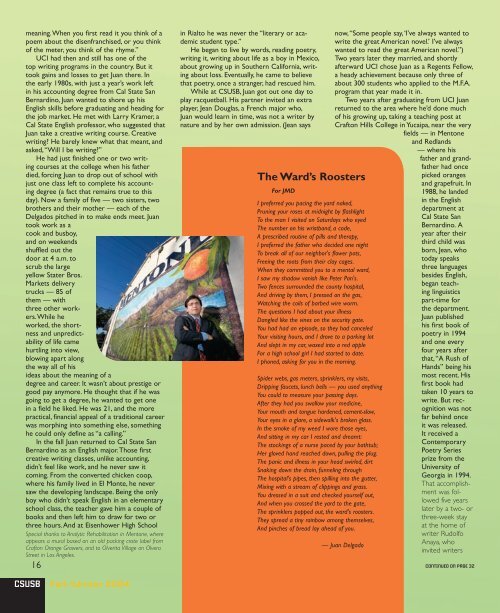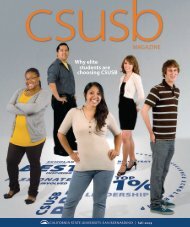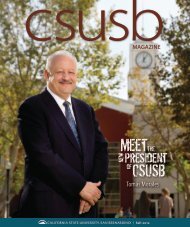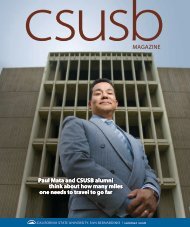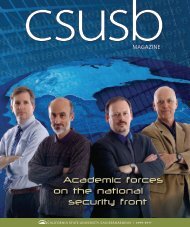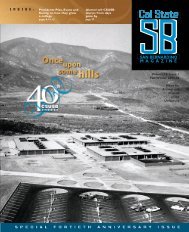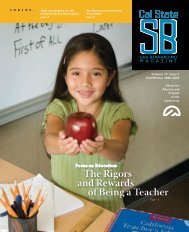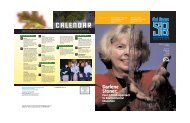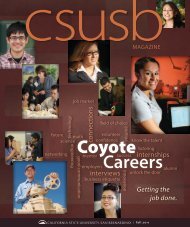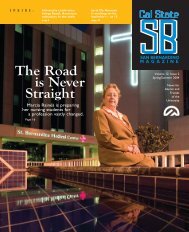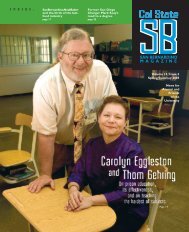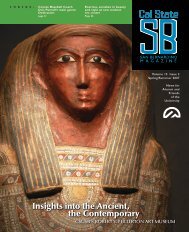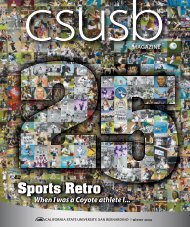04 Fall2.indd - CSUSB Magazine - California State University, San ...
04 Fall2.indd - CSUSB Magazine - California State University, San ...
04 Fall2.indd - CSUSB Magazine - California State University, San ...
You also want an ePaper? Increase the reach of your titles
YUMPU automatically turns print PDFs into web optimized ePapers that Google loves.
meaning. When you first read it you think of apoem about the disenfranchised, or you thinkof the meter, you think of the rhyme.”UCI had then and still has one of thetop writing programs in the country. But ittook gains and losses to get Juan there. Inthe early 1980s, with just a year’s work leftin his accounting degree from Cal <strong>State</strong> <strong>San</strong>Bernardino, Juan wanted to shore up hisEnglish skills before graduating and heading forthe job market. He met with Larry Kramer, aCal <strong>State</strong> English professor, who suggested thatJuan take a creative writing course. Creativewriting? He barely knew what that meant, andasked, “Will I be writing?”He had just finished one or two writingcourses at the college when his fatherdied, forcing Juan to drop out of school withjust one class left to complete his accountingdegree (a fact that remains true to thisday). Now a family of five — two sisters, twobrothers and their mother — each of theDelgados pitched in to make ends meet. Juantook work as acook and busboy,and on weekendsshuffled out thedoor at 4 a.m. toscrub the largeyellow <strong>State</strong>r Bros.Markets deliverytrucks — 85 ofthem — withthree other workers.While heworked, the shortnessand unpredictabilityof life camehurtling into view,blowing apart alongthe way all of hisideas about the meaning of adegree and career. It wasn’t about prestige orgood pay anymore. He thought that if he wasgoing to get a degree, he wanted to get onein a field he liked. He was 21, and the morepractical, financial appeal of a traditional careerwas morphing into something else, somethinghe could only define as “a calling.”In the fall Juan returned to Cal <strong>State</strong> <strong>San</strong>Bernardino as an English major. Those firstcreative writing classes, unlike accounting,didn’t feel like work, and he never saw itcoming. From the converted chicken coop,where his family lived in El Monte, he neversaw the developing landscape. Being the onlyboy who didn’t speak English in an elementaryschool class, the teacher gave him a couple ofbooks and then left him to draw for two orthree hours. And at Eisenhower High SchoolSpecial thanks to Analytic Rehabilitation in Mentone, whereappears a mural based on an old packing crate label fromCrafton Orange Growers, and to Olverita Village on OlveraStreet in Los Angeles.16in Rialto he was never the “literary or academicstudent type.”He began to live by words, reading poetry,writing it, writing about life as a boy in Mexico,about growing up in Southern <strong>California</strong>, writingabout loss. Eventually, he came to believethat poetry, once a stranger, had rescued him.While at <strong>CSUSB</strong>, Juan got out one day toplay racquetball. His partner invited an extraplayer, Jean Douglas, a French major who,Juan would learn in time, was not a writer bynature and by her own admission. (Jean saysThe Ward’s RoostersFor JMDI preferred you pacing the yard naked,Pruning your roses at midnight by flashlightTo the man I visited on Saturdays who eyedThe number on his wristband, a code,A prescribed routine of pills and therapy,I preferred the father who decided one nightTo break all of our neighbor's flower pots,Freeing the roots from their clay cages.When they committed you to a mental ward,I saw my shadow vanish like Peter Pan's.Two fences surrounded the county hospital,And driving by them, I pressed on the gas,Watching the coils of barbed wire worm.The questions I had about your illnessDangled like the vines on the security gate.You had had an episode, so they had canceledYour visiting hours, and I drove to a parking lotAnd slept in my car, waxed into a red appleFor a high school girl I had started to date.I phoned, asking for you in the morning.Spider webs, gas meters, sprinklers, my visits,Dripping faucets, lunch bells — you used anythingYou could to measure your passing days.After they had you swallow your medicine,Your mouth and tongue hardened, cement-slow,Your eyes in a glare, a sidewalk's broken glass.In the smoke of my weed I wore those eyes,And sitting in my car I rested and dreamt:The stockings of a nurse paced by your bathtub;Her gloved hand reached down, pulling the plug.The panic and illness in your head swirled, dirtSnaking down the drain, funneling throughThe hospital's pipes, then spilling into the gutter,Mixing with a stream of clippings and grass.You dressed in a suit and checked yourself out,And when you crossed the yard to the gate,The sprinklers popped out, the ward's roosters.They spread a tiny rainbow among themselves,And pinches of bread lay ahead of you.now, “Some people say, ‘I’ve always wanted towrite the great American novel.’ I’ve alwayswanted to read the great American novel.”)Two years later they married, and shortlyafterward UCI chose Juan as a Regents Fellow,a heady achievement because only three ofabout 300 students who applied to the M.F.A.program that year made it in.Two years after graduating from UCI Juanreturned to the area where he’d done muchof his growing up, taking a teaching post atCrafton Hills College in Yucaipa, near the veryfields — in Mentoneand Redlands— where hisfather and grandfatherhad once— Juan Delgadopicked orangesand grapefruit. In1988, he landedin the Englishdepartment atCal <strong>State</strong> <strong>San</strong>Bernardino. Ayear after theirthird child wasborn, Jean, whotoday speaksthree languagesbesides English,began teachinglinguisticspart-time forthe department.Juan publishedhis first book ofpoetry in 1994and one everyfour years afterthat, “A Rush ofHands” being hismost recent. Hisfirst book hadtaken 10 years towrite. But recognitionwas notfar behind onceit was released.It received aContemporaryPoetry Seriesprize from the<strong>University</strong> ofGeorgia in 1994.That accomplishmentwas followedfive yearslater by a two- orthree-week stayat the home ofwriter RudolfoAnaya, whoinvited writersCONTINUED ON PAGE 32<strong>CSUSB</strong>Fall/Winter 20<strong>04</strong>


